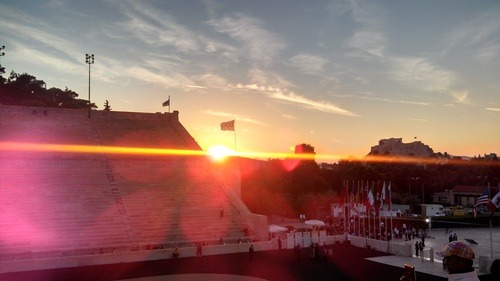
Sunset from the Panathenaic Stadium, located right next door to CYA!
1. Having gotten used to the troubling homelessness of Philadelphia, I immediately noticed that there are not as many (obviously) homeless people here despite an unemployment rate hovering around 27% overall and hitting 61% for youth.
2. However, there are more stray cats and dogs than I can count. They tend to be friendly and it is not uncommon for local people to feed them.
3. People are not referred to as “guys,” as in, “Hey, guys!” Instead, Greeks adopt the genderless noun “paidia” (children). So, when my Greek teacher says “paidia,” it is not said diminutively.
4. Most movies and TV shows, especially the popular ones, are American (some are British), are in English, and are captioned in Greek.
5. Many streets that seem to be sidewalks are also roads for vehicles. Mopeds can fit just about anywhere.
6. Speaking of sidewalks, there is no real designated parking in Athens outside of parking garages, so people park almost anywhere, including and especially half-on the sidewalks. Double parking is not uncommon.
7. Instead of flushing papers down the toilet, you discard them in a garbage can.
8. To get hot water, you must turn a furnace on and wait for the water to heat up. The Greeks are fairly environmentally friendly.
9. Most apartments come with balconies. They are about two feet wide at their narrowest and two and a half at their widest. Balconies are usually loaded with plants overgrowing their pots and growing over the railings.
10. The metro (subway) station is more beautiful than some museums in America and we can all thank the Olympics of 2004 when Athens hosted it.
11. Staring seems socially acceptable. For example, if you are walking, even alone, down the street, it is acceptable and normal for people sitting outside a cafe to stare at you as you walk by. As it was explained to me by a professor, “So what? It just means that you are the most interesting thing on the street.” I am glad I was told this because the first two days, I was convinced I looked ridiculous.
12. The language really does reflect the culture. Everything happens later; it is like all of Athens is a college town. Tavernas and pubs pick up around 9-10pm and clubs pick up later.
13. There are “kiosks” everywhere and they are open from early morning until around midnight every night. They are little booths that sell newspapers, gum, candy, and drinks, including beer and wine.
14. Water is cheap. A six-pack of 1.5L bottles is 1.75€. That is about 2.4 gallons of water for around $2. Little bottles of water are usually 50 lepta (half a euro) or less (so less than $0.65).
15. Wine is also cheap, especially in 1.5L-sized plastic bottles (1.5 to 3 euro). You can buy wine in glass bottles like in the States but even then, the most expensive I have seen is 20 euro (~$25).
16. Only big chain stores accept credit or debit cards. Greece is largely a cash-based economy and the crisis is only solidifying that.
17. Speaking of stores, they have variable hours of operation. The fundamental tradition behind this is that the family and personal health come before everything else. Hence, periods of every work day are designated for rest and Sundays are family days.
18. Pharmacies are everywhere. Pharmacists can make basic diagnoses and can give simple medication like antibiotics without prescriptions from doctors.
19. Fires are rare in Athens because almost all of the buildings are made of concrete. That being said, the common phrase is that “The buildings are made of concrete, but the walls of paper.” Because the walls are concrete, everything echoes and the result is that I hear more than I would often like.
20. Taxes and tips are usually included in listed prices and the bill.
While this is by no means an exhaustive list, these are just some of my first impressions.
Joshua Bryers (CYA FA ’13) Majored in Classics and Biology at the University of Pennsylvania. Originally posted 10 October 2013






